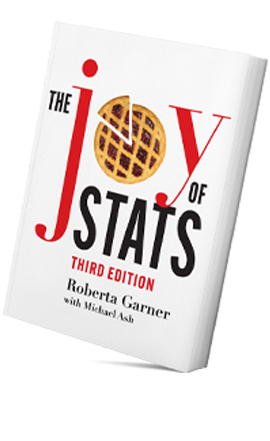Welcome to the world of social statistics.
This is the companion website for The Joy of Stats, Third Edition, by Roberta Garner with Michael Ash. Here on the website you can explore data sets, review concepts and formulas, design small research projects, and prepare for class discussions and lectures.
These materials are available to students, instructors, and independent learners.
All of the files can be downloaded and revised to match your interests. We see these files as resources for trying out ideas and playing with data; they are not peer-reviewed research material.
Questions, comments, and suggestions are always welcome. Please send your feedback to University of Toronto Press.
Learning materials are organized into five sections:
- Slide Decks: The PowerPoint slides can be used for lectures, class discussion, review sessions, and study guides. They are closely linked to chapters, concepts, algorithms, and formulas in the book. Several of them are designed to encourage critical thinking about applied statistics. In this section you will find a brief introductory note with suggestions for using and adapting the PowerPoints for lectures, review, and study guides.
- Data Sets: The data sets are in the SPSS .sav format and can be analyzed with SPSS, R, or any other statistics program that will read the SPSS format. They are accompanied by notes and codebooks, except the Survey Data GSS 2014 file, in which the variable coding is explained in the Variable View screen. You can download them to pursue your questions; you can also add variables and new data once they are downloaded. The various data sets are designed to match a variety of topics and issues in the social sciences and public policy. They present challenges at different levels; they include both individual and place-level data sets, variables of different levels of complexity, and different size samples.
- Lab Guides: The lab guides offer learners a quick start for using both SPSS and R-Commander (a free, easy-to-use interface for R) to analyze the data sets.
- Research Projects: The research projects describe small research projects that can be carried out using the data sets and suggest guidelines for preparing reports and poster sessions.
- Instructor Materials: The instructor materials include additional teaching materials, such as sample syllabi and instructor notes on creating a class data set and using the PowerPoint slides.


